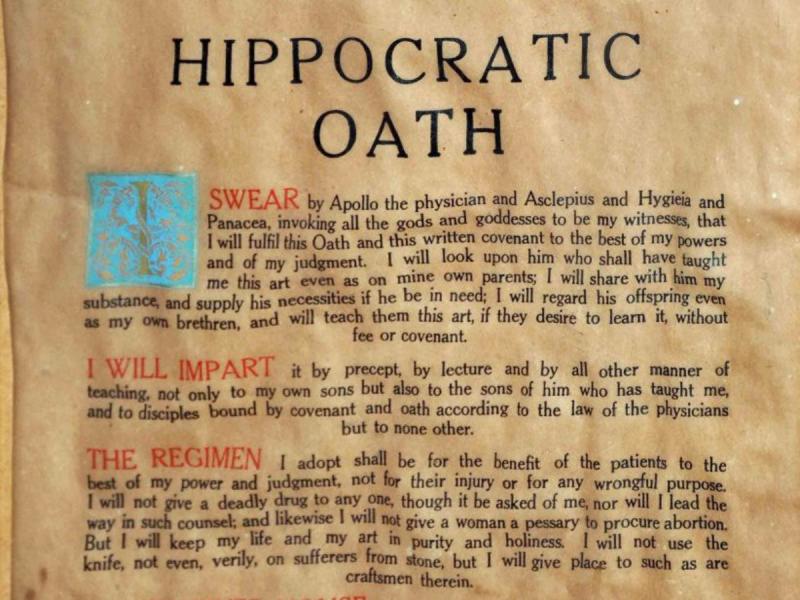Do all doctors have to swear the Hippocratic Oath?
No, not all doctors swear the Hippocratic Oath. The swearing of the Hippocratic Oath is not a universal or mandatory practice for all medical professionals. The decision to administer or take the oath varies among medical schools, institutions, and countries.
Here are a few key points:
Variation in Oaths:
- While the Hippocratic Oath is a well-known and historically significant oath, different medical schools and institutions may have their own variations of the oath or may use different ethical statements altogether.
Secular Oaths:
- In many modern medical schools, oaths have become more secular, allowing for a broader inclusivity of beliefs and values. These oaths often emphasize principles of medical ethics without explicit reference to religious or philosophical traditions.
Legal and Ethical Codes:
- In addition to any specific oath, doctors are bound by legal and ethical codes that govern their professional behavior. For example, medical professionals in the United States often adhere to the principles outlined in the American Medical Association's (AMA) Code of Medical Ethics.
Cultural and Regional Differences:
- Cultural and regional differences can influence whether a medical school incorporates the Hippocratic Oath or a similar oath into its graduation ceremonies. Some medical schools may use a different oath or have their own unique traditions.
Global Variations:
- The use of oaths in medical practice can vary globally. Different countries and cultures may have their own traditions and ethical standards for medical professionals.
Personal Choice:
- In some cases, individual doctors may choose to take or not take an oath based on their personal beliefs and values. Some may feel a strong connection to the principles of the Hippocratic Oath, while others may prefer to express their commitment to medical ethics in different ways.
While the Hippocratic Oath remains a symbol of medical ethics, it is not universally required, and the ethical principles it embodies are typically embedded in various professional codes and guidelines that doctors are expected to follow. Medical professionals are encouraged to uphold the highest standards of ethical conduct in their practice, regardless of whether they take a formal oath.
Do all doctors have to take the Hippocratic Oath?
No, not all doctors have to take the Hippocratic Oath. It is an ancient oath that was first written in Greece around the 5th century BC, and it outlines the duties of physicians to their patients and their colleagues. However, the Hippocratic Oath is not a legal requirement, and not all medical schools require their students to take it.
While not required, the Hippocratic Oath is still widely respected in the medical profession. Many medical schools do include it in their graduation ceremony, and many doctors do choose to follow its principles.
What is the significance of the Hippocratic Oath in the medical profession?
The Hippocratic Oath is significant in the medical profession because it provides a set of ethical principles for physicians to follow. These principles include:
- Primum non nocere: First, do no harm.
- Beneficence: Act in the best interests of the patient.
- Autonomy: Respect the patient's right to make their own decisions.
- Justice: Treat all patients equally.
The Hippocratic Oath also emphasizes the importance of confidentiality, honesty, and integrity. These principles are essential for building trust between physicians and their patients.
Are there variations in the adoption of the Hippocratic Oath among medical practitioners?
Yes, there are some variations in the adoption of the Hippocratic Oath among medical practitioners. For example, some medical schools have developed their own versions of the oath to reflect the current state of medical practice. Additionally, some physicians may choose to focus on certain aspects of the oath more than others.
However, the core principles of the Hippocratic Oath are universally accepted by medical practitioners. These principles are essential for ensuring that patients receive high-quality, ethical care.
Here are some examples of variations in the adoption of the Hippocratic Oath among medical practitioners:
- Some medical schools may require their students to take a modified version of the Hippocratic Oath that is more inclusive of modern medical practices.
- Some physicians may choose to focus on certain aspects of the oath more than others, such as the principle of beneficence or the principle of autonomy.
- Some physicians may choose to take an oath that is specific to their particular field of medicine, such as the Oath of the Family Physician.
Overall, the Hippocratic Oath is an important set of ethical principles for medical practitioners to follow. It provides a framework for decision-making and helps to ensure that patients receive high-quality, ethical care.











